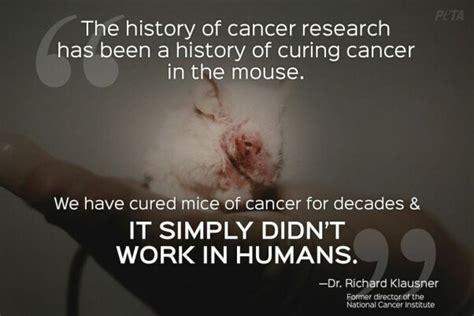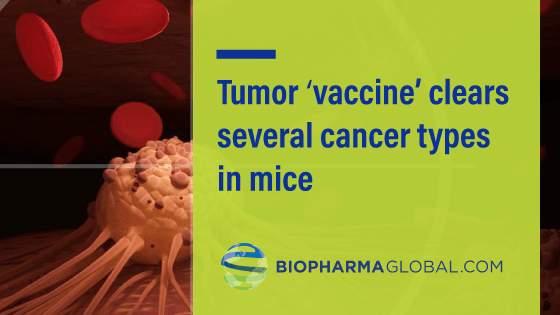一种癌症疫苗治愈了小鼠97%的肿瘤。这对人们意味着什么?
一种很有前景的新型癌症“疫苗”将首次在人类身上进行测试,这种疫苗可以治愈多达97%的小鼠肿瘤,但专家们说,我们离癌症患者开的这类药物还有很长的路要走。
图示:癌症研究的历史就是在老鼠身上治愈癌症的历史。 人类已经治愈老鼠的肿瘤几十年了。。。
很简单,用在老鼠身上的方法在人类身体上无效。
据旧金山当地新闻媒体SFGate报道,斯坦福大学的研究人员将在今年年底对大约35名患有淋巴瘤的患者进行治疗。这种疗法会刺激人体的免疫系统来攻击癌细胞。研究人员说,在对各种癌症(包括淋巴瘤、乳腺癌和结肠癌)的小鼠的研究中,即使肿瘤已经扩散到身体的其他部位,这种治疗方法也能在90只小鼠中治愈87个肿瘤。
位于纽约州韦斯特切斯特的诺斯韦尔健康癌症研究所(Northwell Health Cancer Institute)的乳腺外科区域主任爱丽丝·警方(Dr. Alice Police)没有参与这项研究。她说,人类试验这种疗法的消息“令人兴奋”。然而,她提醒说,动物实验的结果并不总是能转化为人类。
“我们已经在老鼠身上治愈了很多癌症很久了,”警察告诉现场科学。更重要的是,目前的人体试验是针对淋巴瘤患者的,因此,医生们知道这种治疗方法是否适用于其他癌症,如乳腺癌和结肠癌,还需要很多年的时间。
癌症疫苗?
从技术上讲,这种新疗法并不是一种疫苗,它是一种可以长期抵抗疾病的物质。但SFGate报道说,这种疗法确实需要注射疫苗。(根据美国临床肿瘤学会(American Society of Clinical Oncology)的说法,一种“癌症疫苗”可以指一种用于预防癌症复发的治疗方法,并能摧毁仍在体内的癌细胞。)
相反,治疗是一种免疫疗法。它包含两种药物的结合,刺激T细胞,一种免疫细胞,来攻击癌症。正常情况下,身体的T细胞会认为癌细胞是不正常的,会渗透并攻击它们。但随着肿瘤的生长,它抑制T细胞的活动,使这些细胞不再能阻止癌症的发生。
新的治疗方法是重新激活这些T细胞。研究人员将“疫苗”直接注射到肿瘤中。两种药物在治疗工作中协同激活T细胞。研究人员说,由于这些T细胞已经在肿瘤内部,所以它们基本上已经被身体“预先筛选”,以识别癌症特异性蛋白。
在动物实验中,将治疗注射到一个肿瘤中,以消除身体其他部位的肿瘤(所谓的转移性癌症)。这是因为活性T细胞迁移到身体的其他部位并破坏扩散的肿瘤。
在1月31日发表在《科学转化医学》(Science Translational Medicine)杂志上的一项研究中,科学家们对基因改造过的老鼠进行了治疗,这些老鼠的乳腺中有10个都患有乳腺癌。研究人员说,该药物被注射到第一个出现在动物体内的肿瘤中,研究人员发现,这种治疗方法也能防止许多病例发生未来的肿瘤。
有前途的免疫疗法
免疫疗法并不新鲜;事实上,其他几种免疫疗法已经被批准用于治疗癌症。例如,一种被称为CAR-T细胞疗法的疗法,最近被批准用于某些类型的白血病和淋巴瘤,包括从病人体内移除某些免疫细胞,并通过基因工程使这些细胞与癌症抗争。
研究人员说,与CAR-T细胞疗法相比,新疗法的一个优点是它不需要医生去移除和定制患者的免疫细胞来对抗癌症。斯坦福大学医学院肿瘤学教授、《科学转化医学研究》的资深作者罗纳德·莱维博士在一份声明中说:“我们正在攻击特定的目标,而不需要准确识别T细胞所识别的蛋白质。”
同时,有趣的是,这项研究可能对结肠癌和乳腺癌有影响,这两种癌症目前还没有免疫疗法,警方说。
Police说:“我们已经在这条路上走了一段路,”为这些癌症进行免疫治疗。“但这仍是一个漫长的过程。”
新的试验是一个阶段I的研究,这意味着它将只测试治疗的安全性,而不是设计决定它的有效性。
https://s.click.taobao.com/hYsTINw
参考文献
A Cancer 'Vaccine' Cured 97% of Tumors in Mice. What's That Mean for People?
A promising new cancer "vaccine" that cured up to 97 percent of tumors in mice will soon be tested in humans for the first time — but experts say that we're still a long way off from this type of drug being prescribed to cancer patients.
Researchers from Stanford University will test the therapy in about 35 people with lymphoma by the end of the year, according to SFGate, a local news outlet in San Francisco. The treatment stimulates the body's immune system to attack cancer cells. In studies in mice with various cancers — including lymphoma, breast cancer and colon cancer — the treatment eliminated cancer tumors in 87 out of 90 mice, even when the tumors had spread to other parts of the body, the researchers said.
Dr. Alice Police, the regional director of breast surgery at Northwell Health Cancer Institute in Westchester, New York, who was not involved in the study, said that the news of a human trial to test this treatment is "exciting." However, she cautioned that results in animal studies don't always translate to people.
Advertisement
"We've been able to cure a lot of cancers in mice for a long time," Police told Live Science. What's more, the current human trials are for patients with lymphoma, and so it could be many years before doctors know if this treatment works for other cancers, such as breast and colon cancer, Police said. [10 Do's and Don'ts to Reduce Your Risk of Cancer]
A cancer vaccine?
The new treatment is not technically a vaccine, a term used for substances that provide long-lasting immunity against disease. But the treatment does involve a vaccine-like injection, SFGate reported. (According to the American Society of Clinical Oncology, a "cancer vaccine" can refer to a treatment that's used to prevent cancer from coming back and destroys cancer cells that are still in the body.)
Instead, the treatment is a type of immunotherapy. It contains a combination of two agents that stimulate T cells, a type of immune cell, to attack cancer. Normally, the body's T cells recognize cancer cells as abnormal and will infiltrate and attack them. But as a tumor grows, it suppresses the activity of the T cells so that these cells can no longer keep the cancer at bay.
The new treatment works by reactivating these T cells. Researchers inject the "vaccine" directly into the tumor. The two agents in the treatment work synergistically in activating the T cells. Because these T cells were already inside the tumors, they have essentially been "prescreened" by the body to recognize cancer-specific proteins, the researchers said.
In the animal studies, injecting the treatment into just one tumor worked to eliminate tumors in other parts of the body (so-called metastatic cancers). This occurs because active T cells migrate to other parts of the body and destroy tumors that have spread.
In a study that was published Jan. 31 in the journal Science Translational Medicine, scientists gave the treatment to mice that were genetically engineered to develop breast cancer in all 10 of their mammary pads. The drug was injected into the first tumor that appeared in the animal, and the researchers found that the treatment also prevented the occurrence of future tumors in many cases, the researchers said.
Promising immunotherapies
Immunotherapy is not new; indeed, several other immunotherapies have been approved for treating cancer. For example, a treatment called CAR T-cell therapy, which was recently approved for some types of leukemia and lymphoma, involves removing certain immune cells from patients' bodies and genetically engineering those cells to fight cancer.
Compared with CAR T-cell therapy, one advantage of the new treatment is that it doesn't require doctors to remove and customize the patient's immune cells for fighting cancer, the researchers said. "We're attacking specific targets without having to identify exactly what proteins the T cells are recognizing," Dr. Ronald Levy, a professor of oncology at Stanford University School of Medicine and the senior author of the Science Translational Medicine study, said in a statement.
It's also interesting that the work may have implications for colon and breast cancer, two cancers for which there are currently no immunotherapies, Police said.
"We've [gone] one step further down the road" to an immunotherapy for these cancers, Police said. "But it's [still] a long way to go."
The new trial is a phase I study, which means it will test only the safety of the treatment and is not designed determine how effective it is.
Original article on Live Science.
https://www.livescience.com/62161-cancer-vaccine-trial.html



.png)
.png)